unit 3英语
Unit3词汇精讲及短语人教版七年级英语下册

1.get to 到达例句:你怎么到学校?(G7下,U3,P13) How do you get to school?【注意】:当地点是副词home/here/there等时,to要省略。
例句:到家要多久?(G7下,U3,P15) How long does it take to get home?【扩展】:get to= arrive in/at或reach arrive at+小地点arrive in +大地点reach +地点(及物动词直接接地点)2.train/trem/cn.火车------复数trains短语:go to...by train=go to... on a/the train= take a/ the train to ...乘火车去……例句:你怎么去学校?How do you go to school?I take the train the school.=I go to school by train/ on the train3.bus Cn.公共汽车--------复数buses短语:go to...by bus=go to... on a/the bus= take a/ the bus to ...乘公交车去……例句:他坐公交车上班。
He takes the bus to work=He goes to work by bus/on the bus.例句:你的朋友们坐公交车上学吗?Do your friends go to school by bus?4. subway Cn. 地铁------复数subways例句:我骑自行车去地铁站。
短语:go to...by subway=go to... on the subwaytake the subway to...乘地铁去......例句:我们乘地铁去公园we take the subway to the park.=we go to the park by subway/on the subway.5.ride vt.骑cn.旅程------过去式rode 单三形式rides-----现在分词riding 骑手(cn.) rider短语:ride a /the /one’s bike(s) to== go to …by bike=go to… on a /the bike 骑直行车去……骑马ride a horse ==go ridingI ride my bike to school every morning .6.bike/bak/cn.自行车-----复数bikes短语:ride a bike 例句:你是走路还是骑自行车呢?Do you walk or ride a bike?7.sixty num.六十-----复数sixties ----序数词sixtieth8. Seventy num. 七十-----复数seventies -----序数词seventieth 9. eighty num.八十-----复数eighties -----序数词eightieth 10. ninety num. 九十----复数nineties----- 序数词ninetieth 11. hundred /'h ndr d/num. 一百【注意】:hundred 前有数字时,hundred 不用复数,直接接可数名词复数,也不与of 连例句:2000名学生在这个学校There are 2000 students in the school.【注意】表示一个不确定数时,前面没有具体数字,其后加s ,与of 连用。
英语1(基础模块)unit3知识点及练习

英语1(基础模块)unit3知识点及练习thereis 英语1(基础模块)知识点及练习Unit Three How much is it ?一、词汇store=shop, downtown cell phone = mobile phone takekilo kilos a kilo of two kilos of kilometer kilograma pair of shoes a pair of pants a pair of glasses二、短语How much how many on sale different , be different fromtwo yuan a kilo three yuan for each go shopping shopping list sell out(sold out)food of different flavors, at a good price at very attractive prices buy sth for sbon that day used to do sth heavy traffic take / have +时间 + off line up三、句型Can I help you? What can I do for you? Is there any discount? = what’s the discountWhat’s the original price? I will take it . Here you are !How much is the app le ?= what’s the price of the apple.1、语法There be1)There be 句型与have, has的区别1、There be 句型表示:在某地有某物(或人)2、在there be 句型中,主语是单数,be 动词用is ; 主语是复数,be 动词用are ; 如有几件物品,be 动词根据最*近be 动词的那个名词决定。
人教版九年级英语Unit3重点知识归纳
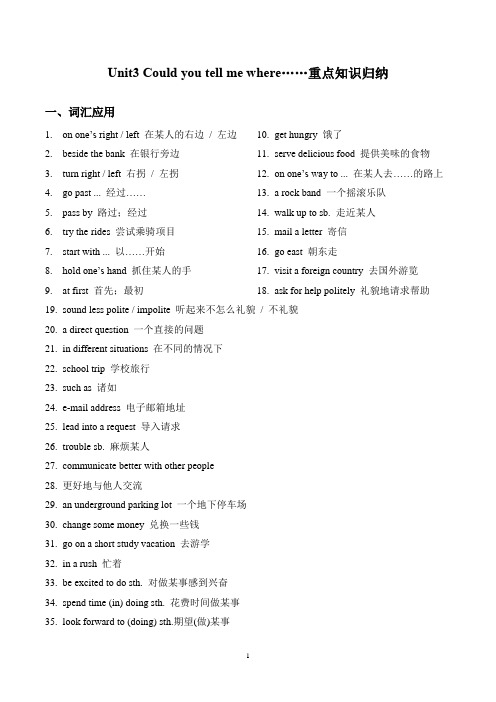
Unit3 Could you tell me where……重点知识归纳一、词汇应用1.on one’s right / left在某人的右边/ 左边2.beside the bank 在银行旁边3.turn right / left 右拐/ 左拐4.go past ... 经过……5.pass by 路过;经过6.try the rides 尝试乘骑项目7.start with ... 以……开始8.hold one’s hand 抓住某人的手9.at first 首先;最初10.get hungry 饿了11.serve delicious food 提供美味的食物12.on one’s way to ... 在某人去……的路上13.a rock band 一个摇滚乐队14.walk up to sb. 走近某人15.mail a letter 寄信16.go east 朝东走17.visit a foreign country 去国外游览18.ask for help politely 礼貌地请求帮助19.sound less polite / impolite 听起来不怎么礼貌/ 不礼貌20.a direct question 一个直接的问题21.in different situations 在不同的情况下22.school trip 学校旅行23.such as 诸如24.e-mail address 电子邮箱地址25.lead into a request 导入请求26.trouble sb. 麻烦某人municate better with other people28.更好地与他人交流29.an underground parking lot 一个地下停车场30.change some money 兑换一些钱31.go on a short study vacation 去游学32.in a rush 忙着33.be excited to do sth. 对做某事感到兴奋34.spend time (in) doing sth. 花费时间做某事35.look forward to (doing) sth.期望(做)某事e on 加油;快点儿37.pardon me 抱歉,对不起;什么,请再说一遍二、重点句型1.问路常用的句子:①Do you know where is … ?①Can you tell me how can I get to …?①Could you tell me how to get to …?①Could/Will/Would you please tell me sth.表示十分客气地询问事情Could you tell me how to get to the park?请你告诉我怎么才能去邮局好吗?2. decide to do 决定做…...She decided to go to have lunch. 她决定去吃午餐。
Unit 3 英语口语place of study

5.给我说说你的学校。 Talk about your school. 我的学校很大也很漂亮。 My school is big and very beautiful.
6.你的教室在几楼? Which floor is your classroom on? 在三楼 It is on the third floor.
Place of Study 学习场所
邱琲Betty
Word Service Station
accommodation n.住宿 laboratory=lab n.实验室 bookcase n.书架 examiner n.考试者 primary school 小学 cafeteria n.自助小餐厅 dining ha How long does it take you to go to school by bus? 从我家到学校大概要花35分钟。 It takes me about 35 mimutes to go to school fom my home. 4.你家离学校多远? How far is it from your home to your school? 从我家到学校大约有5公里。 It's about 5 kilometres from my home to the school.
education n. 教育 favorite adj. 最喜爱的 rector n. 校长 scholarship n.奖学金 fountain n.喷泉 classroom building 教学楼 uniform n.校服
动态介词 指南针:from,to, up, down, along, across
exercise n.练习 projector n.投影仪 camps n.校园 experiment n.实验 pupil n.小学生 canteen n. 餐厅 swimming pool 游泳池
人教版九年级英语unit3知识内容

人教版九年级英语unit3知识内容我们全都要从前辈和同辈学习到一些东西。
就连最大的天才,如果想单凭他所特有的内在自我去对付一切,他也决不会有多大成就。
下面给大家带来一些关于人教版九年级英语unit3知识内容,希望对大家有所帮助。
一.Unit3单词restroom [?restru:m] n.(美)洗手间;公共厕所stamp [st?mp] n. 邮票;印章bookstore [?bukst?:(r)] n. 书店beside[b??sa?d] prep. 在……旁边;在……附近postcard [?p?ustka:(r)d] n. 明信片pardon [?pa:(r)dn] v. 原谅 interj.请再说一遍 washroom [?w??ru:m] n. 洗手间;厕所 bathroom [?bɑ:θru:m] n. 浴室;洗手间 normally ['n?:rm?li] adv.通常;正常情况下 rush [r??] v. & n. 仓促;急促 suggest [s??d?est] v. 建议;提议 pass by 路过;经过 staff [sta:f] n. 管理人员;职工 grape [greip] n. 葡萄central [?sentr?l] adj. 中心的;中央的Nearby [?n?r?ba?] adj.附近的;邻近的 adv.在附近;附近 Pardon me 抱歉, 对不起;什么,请再说一遍 mail [meil] v. 邮寄;发电子邮件 n. 邮件 east [i:st] adj. 东方的;东部的adv.向东;n.东方 fascinating [?f?sineiti?] adj.迷人的;有吸引力的.Inexpensive[??n?k?spens?v] adj.不昂贵的Uncrowded [?n?kra?d?d] adj.不拥挤的;人少的convenient [k?n?vi:ni?nt] adj. 便利的;方便的 mall [m?:l] n. 商场;购物中心 clerk [kla:k][kl:rk] n. 职员corner [?k?:(r)n?(r)] n. 拐角;角落politely [p??laitli] adv. 礼貌地;客气地request [ri?kwest] n. 要求;请求direction [di?rek?n] [dai?rek?n] n. 方向;方位 correct [k??rekt] adj. 正确的;恰当的 polite [p??lait] adj. 有礼貌的;客气的 . direct [di?rekt, dai?rekt] adj. 直接的;直率的.speaker [?spi:k?] n.讲(某种语言)的人;发言者 whom [hu:m] pron. 谁;什么人 impolite [??mp??la?t] adj. 不礼貌的;粗鲁的address [??dres], [??dres] n.住址;地址;通讯处.Underground [??nd?ɡra?nd] adj.地下的;n.地铁 Parking lot n.停车场 course [k?:(r)s] n. 课程;学科 Italian [I?t?li ?n] adj.意大利\人的;n.意大利人\语 Tim [tim] 蒂姆(男名)二.Unit3知识梳理【重点短语】1.a pair of 一对,一双,一副2.between A and B 在a和b之间3.on one’s / the way to 在去……的路上4.pardon me 什么,请再说一遍5.pass by 路过经过6.look forward to 盼望期待7.excuse me 打扰了请原谅8.get some information about 获取有关……的一些信息9.turn left\right 向左\向右转10.go past 经过路过11.a little earlier 早一点儿12.a good place to eat 一个吃饭的好地方13.in different situation 在不同的情况下14.on time 准时按时15.get to 到达16.have dinner 吃晚餐17.on one’s / \the right在右边e on 快点请过来19.the shopping center 购物中心20.the corner of....... 的角落/拐角处21.lead into 导入,引入【重点句型】1.问路常用的句子:①Do you know where is … ?②Can you tell me how can I get to …?③Could you tell me how to get to …?④Could/Will/Would you please tell me sth. 表示十分客气地询问事情Could you tell me how to get to the park?请你告诉我怎么才能去邮局好吗?2. decide to do 决定做…...She decided to go to have lunch. 她决定去吃午餐。
九年级英语Unit3知识点总结

九年级英语Unit3《Could you please tell me where therestrooms are?》知识点ed to 过去常常be used to doing 习惯于做某事be used for doing = be used to do 被用来做某事2. be afraid of 害怕be afraid to do 害怕做某事3. from time to time 时常;有时sometimesat timesonce in a while4. turn red 变红turn get become be5. take up 开始做6. deal with 对付;应付How…deal with? = What…. do with?7. not…anymore 不再no morenot.. any longer no longer8. tons of attention 很多关注lots of=a lot of=plenty of9. worry about 担心be worried about10. be careful = take care = look out当心11. hang out 闲逛hang-hung-hung hang-hanged-hanged12. give up 放弃look forward to盼望put off 推迟pay attention to 注意concentrate on 集中注意力have fun玩的开心have trouble in doing 做某事有困难can’t stand 不能忍受…13. think about 考虑think over 仔细考虑think hard 苦苦思索14. a very small number of… 极少数的……a large number of15. be alone 独处alone & lonely16. give a speech 做演讲17.宾语从句;宾语从句在复合句中作主句的宾语。
译林版英语Unit3 知识点梳理

五年级上册英语Unit3 知识点归纳一、词组:1. our animal friends 我们的动物朋友2. one … the other…一个…,另一个……3.big eyes 大眼睛4. big bodies 大身体5. have no legs 没有腿6. an animal friend 一个动物朋友7. a short tail 一条长尾巴8.red eyes 红眼睛9.long ears 长耳朵10.a big mouth 一个大嘴巴11. sunny weather 晴朗的天气12. come out 出来13. in the US 在美国14. in Canada 在加拿大15. in Australia 在澳大利亚16. give it a cake = give a cake to it 把蛋糕给它17.on the farm 在农场18. draw an animal 画一个动物二、句型:1. I have two animal friends. One is red, the other is black.One is a cat, the other is a dog.我有二个动物朋友。
一条是红色的,另一条是黑色的。
2. They have no legs or arms, but they have big tails.它们既没有腿也没有手臂,但是它们有大尾巴。
3. It has four legs and a short tail. 它有四条腿和一条短尾巴。
4.My animal friend is yellow and green.我的动物朋友是黄绿相间的。
5.It has two feet.它有两只脚。
6. What animals do you have? I have some fish. 你有什么动物?我有一些鱼。
7. What animals does Su Hai have? She has a parrot. 苏海有什么动物?她有一只鹦鹉。
新人教版七年级英语下册Unit3词汇与句型
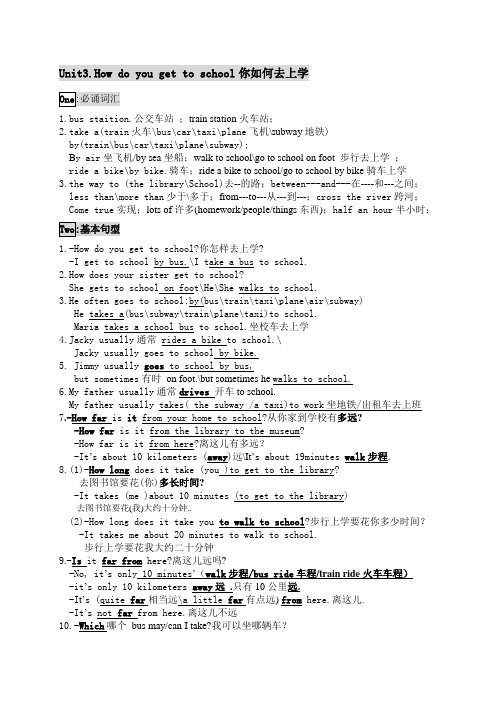
Unit3.How do you get to school你如何去上学1.bus staition.公交车站;train station火车站;2.take a(train火车\bus\car\taxi\plane飞机\subway地铁)by(train\bus\car\taxi\plane\subway);B y air坐飞机/by sea坐船;walk to school\go to school on foot 步行去上学;ride a bike\by bike.骑车;ride a bike to school/go to school by bike骑车上学3.the way to (the library\School)去--的路;between---and---在----和---之间;less than\more than少于\多于;from---to---从---到---;cross the river跨河;Come true实现;lots of许多(homework/people/things东西);half an hour半小时;1.-How do you get to school?你怎样去上学?-I get to school by bus.\I take a bus to school.2.How does your sister get to school?She gets to school on foot\He\She walks to school.3.He often goes to school:by(bus\train\taxi\plane\air\subway)He takes a(bus\subway\train\plane\taxi)to school.Maria takes a school bus to school.坐校车去上学4.Jacky usually通常 rides a bike to school.\Jacky usually goes to school by bike.5. Jimmy usually goes to school by bus,but sometimes有时on foot.\but sometimes he walks to school.6.My father usually通常drives 开车to school.My father usually takes( the subway /a taxi)to work坐地铁/出租车去上班7.-How far is it from your home to school?从你家到学校有多远?-How far is it from the library to the museum?-How far is it from here?离这儿有多远?-It’s about 10 kilometers (away)远\It’s about 19minutes walk步程.8.(1)-How long does it take (you )to get to the library?去图书馆要花(你)多长时间?-It takes (me )about 10 minutes (to get to the library)去图书馆要花(我)大约十分钟..(2)-How long does it take you to walk to school?步行上学要花你多少时间?-It takes me about 20 minutes to walk to school.步行上学要花我大约二十分钟9.-Is it far from here?离这儿远吗?-No, it’s only 10 minutes’(walk步程/bus ride车程/train ride火车车程)-it’s only 10 kilometers away远.只有10公里远.-I t’s (quite far相当远\a little far有点远) from here.离这儿.-It’s not far from here.离这儿不远10.-Which哪个bus may/can I take?我可以坐哪辆车?-You can take No.5 bus there.你可以做5路车去那儿。
高中英语必修三Unit3单词

高中英语必修三Unit3单词1. diverse adj.不同的:多种多样的diversity n.差异(性);不同(点);多祥性2. fortune n.机会:运气气fortune cookie幸运曲奇3.gumbo n.秋葵汤(用秋葵荚做的浓鸡汤或海鲜汤)4.nachos n. [pl.] 墨西哥玉片5. chip (英)炸土豆条:(美)炸薯片:芯片:碎片6.cheese n.干酪;奶酪7.spicy adj加有香料的:辛辣的8.ethnic adj.具有民族特色的:异国风味的:民族的:种族的9.admit vi.&vt 承认vt.准许进入(或加入)10.definitely adv.肯定;确实11.occur vi. 发生:出现12.downtown adv.在市中心:往市中心13.mission n.传教(区);重要任务;使命14.districtn.地区;区域15.graffiti n. [pl]涂鸦;胡写乱画ic n.连环画杂志;漫画杂志;喜剧演员adj.滑稽的;使人发笑的17.afterwards(NAmE usually afterward) adv. 以后;后来18.head to .朝....前进;向.....去19.historical adj. (有关)历史的20.seek vt.& vi. (sought /s:t/,sought)寻找;寻求;争取: (向人)请求seek one's fortune寻找成功致富之路;闯世界21.earn/3an/v.&vi.挣得;賺得;赢得;博得earn a living谋生22.immigrant n. (外来)移民:外侨23. select vt. 选择;挑选;选拔24. china n.瓷;瓷器25. jazz n.爵士乐26.bar n.酒吧;小吃店;小馆子27.diagram n.简图;图解;图表:28. journal n.日志;日记;报纸;刊物29. claim v.&.n.夺取(生命);宣称;断言30. series n.系列;连续;接连series of系列或一连串(事件)31.apart from ( especially NAmE aside from )除了....外(还) ;此外32.minority n.少数民族;少数派;少数人33. escape vi.& vt. 逃走;逃脱;避开n.逃跑;逃脱;解脱34. bring about导致;引起35.Atlantic adj.大西洋的36.financial adj.财政的;财务的;金融的37. poetry n.诗集;诗歌;诗作38. jeans n.牛仔裤39. boot n.靴子40. mushroom n.蘑菇;蕈41. poisonous adj.引起中毒的;有毒的;分泌毒素的poison n.毒物;毒药;毒素 vt.毒死;毒害42. fold vt.包;裹;折叠vt.&vi.(可)折小;(可)叠平43. super adv.特别;格外 adj.顶好的;超级的44. collection n.作品集;收集物;收藏品44. accessory n.配饰;附件;配件45. souvenir n.纪念物;纪念品46. percentage n.百分率;百分比47. climate n.气候48. mild adj.温和的;和善的;轻微的49.settle vt.& vi.定居;结束(争论);解决(纠纷)49. construction n.建筑;建造;建造物; (句子、短语等的)结构50. material n.材料;布料;素材 adj.物质的;实际的51. to name but a few仅举几例52. tai chi (also t'ai chi)n.太极拳52. clothing n.衣服;服装54. herbal adj.药草的;香草的55. suit vt. 适合;满....需要;相配;合身n.西服;套装56. [at) first hand第一手;亲自57. item n.项目; -件商品(或物品);一条(新闻)58. contain vt.包含;含有;容纳59. contain vt.包含;含有;容纳图60. neat adj.极好的;整洁的;整齐的61. San Francisco 圣弗朗西斯科(旧金山) ( 美国城市)62. Napa Valley 纳帕谷(美国)62. the Golden Gate Bridge金门桥63. the Mission District教会区(旧金山)人64. Mexico 墨西哥(北美洲国家)65.California 加利福尼亚( 美国州名)65. Cantonese adj.广东的;粤语的n.粤语;广东人66. the Richmond District里士满区(旧金山)67. Huangguoshu Waterfall 黄果树瀑布68Journey to the West《西游记》69. Tin How Temple天后古庙70. Bank of Canton 广东银行71. Potsmouth Square花园角广场(旧金山)72. Robert Louis Stevenson罗伯特●路易斯.斯蒂文森 (英国作家)。
新人教版高中英语选择性必修一Unit3

新人教版高中英语选择性必修一Unit3Unit 3 Fascinating ParksPart 1 Word and Expressions1、buffet vt.连续猛击;打来打去 n.自助餐①buffet sb./sth.连续猛击某人/物②buffet one's way打开一条路(尤指在困难条件下);(船)乘风破浪2、edge n.边;边缘;边线;刀刃 vt.&vi.(使)徐徐移动;给...加边①edge towards...朝……缓慢移动②edge along...沿……缓慢移动③on edge竖着;直立着;紧张不安的④at the edge of在……边缘处3、ban vt.明令禁止;取缔 n.禁令①ban(doing)sth.禁止(做)某事②ban sb.from doing sth.禁止某人做某事③a ban on/against sth.对某事的禁令④place/put...under a ban禁止……【拓展】“禁止,阻止”ban/prohibit/forbid/stop/keep/prevent+sb.+from doing sth.forbid+sb.+to do sth.4、visible adj.看得见的;可见的——反义词:invisible adj.看不见的;不可见的be visible to...……能看见5、accompany vt.陪同,陪伴;与...同时发生,伴随;(尤指用钢琴)为…伴奏company n.陪伴;公司accompanying adj.陪伴的;伴随的①accompany sb.at/on sth.(尤指用钢琴)为某人伴奏②be accompanied by由某人陪同;由……伴奏③accompany sb.=keep pany陪伴某人④accompany sb.to someplace陪同某人到某地6、adopt vt.采用;采取;采纳 vt.&vi.领养adopted adj.被收养的;被采用的adoptable adj.可采用的,可收养的adoption n.采用;收养adopt...as...选……作为……;收养……为……7、bless vt.祝福blessing n.祝福;赐福;恩赐be blessed with... 有幸得到…8、prohibit vt.禁止;阻止prohibition n.禁令;禁律①prohibit doing sth.禁止做某事②prohibition on/against......的禁令③prohibit sb./sth.from doing sth.禁止某人/某物做某事9、stretch vi.延伸;延续 vi.&vt.伸展;舒展①stretch for延伸②stretch oneself伸懒腰③stretch over延续④stretch out延伸;绵延;伸直(四肢)⑤stretch to拉长到10、rewarding adj.值得做的;有益的reward n.奖励,回报,报酬;悬赏金 vt.奖励;奖赏;给以报酬①in reward(for)作为(对...的)回报②reward sb.with sth.用某物奖励某人③a reward for(doing)sth.因(做)某事而获得的奖励④give/offer a reward to sb.for sth.为某事而给某人奖励⑤reward sb.for(doing)sth.因为(做)某事而奖励某人11、ahead adv.向前;在前面;提前①ahead of在...前面;领先于②ahead of time提前③ahead of one’s time领先于某人/某物的时代④go ahead继续;说吧,用吧;拿吧⑤go straight ahead一直彽前走⑥look/think/plan ahead展望/考虑/计划未来12、incredible adj.极好的;极大的;难以置信的credible adj.可信的incredible adv.难以置信地13、appeal vi.有吸引力;呼吁;恳求;上诉n.吸引力;呼吁;上诉;请求appealing adj.有吸引力的;恳求的①appeal to有吸引力;有感染力;恳求;上诉;呼吁②appeal for sth.呼吁某事③appeal to sb.for sth./to do sth.呼吁某人做某事④make an appeal to sb.for sth.向某人呼吁某事⑤make an appeal to sb.to do sth.向某人呼吁做某事14、wander n.游荡;闲逛;流浪 vt.&vi.闲逛;漫游 vi.走失;离散;走神①wander around在…前后转来转去②wander back to回想到③wander from从...离开④wander off迷失;离开正途或正确的方向15、amusement n.娱乐(活动);愉悦amuse vt.(提供)消遣;(使)娱乐amused adj.逗乐的;觉得好笑的amusing adj.有趣的;逗乐的①to one’s amusement令某人感到好笑的是②be amused at/by对...感到好笑③amuse oneself(by doing sth)(通过做某事)自娱自乐④be amused to do sth.做某事而感到好笑16、enormous adj.极大的;巨大的enormously adv.极大地17、fashion n.时尚;时兴;流行款式fashionable adj.流行的;时髦的;时尚的①be in fashion/come into fashion流行②go/be out of fashion过时18、rare adj.稀少的;珍贵的;(肉)半熟的rarely adv.不经常;很少It is rare for sb. to do sth. 某人做某事很罕见19、superb adj.极佳的;卓越的superbly adv.极佳地20、display n.展览;陈列;展览品 vt.显示;陈列①on display在展览中(=on show)②place/put sth.on display把...进行展览③a window display橱窗陈列④a firework display焰火表演21、appetite n.食欲;胃口;强烈欲望①have a good appetite有一个好食欲②have a...appetite for对...有强烈的欲望③work up an appetite增强食欲④spoil/ruin one’s appetite坏了胃口;影响食欲21、entertainment n.娱乐;招待;娱乐活劢;文娱节目entertain vt.使快乐;给...娱乐;款待;招待;请客entertainer n.款待者;表演者;艺人entertaining adj.使人愉快的;有趣的①entertainment business娱乐界②provide the entertainment提供娱乐③the entertainment of friends招待朋友④entertain sb.with sth.用...娱乐某人22、leave behind留下;遗留;丢下;把……抛在后面;超过【拓展】有关leave的词组①leave alone不管;别惹;让...一个人待着②leave aside搁置一旁;不考虑③leave for动身去④leave off停止;中断⑤leave out省略;遗漏;被冷落23、apart from除...之外(都);除...之外(还)【辨析】apart from/aside from/except for/besides/in addition to/as well as/but(1)apart from=aside from=except for除……之外,先说整体如何,再修正局部。
人教版七年级英语上册unit 3句式讲解及知识梳理
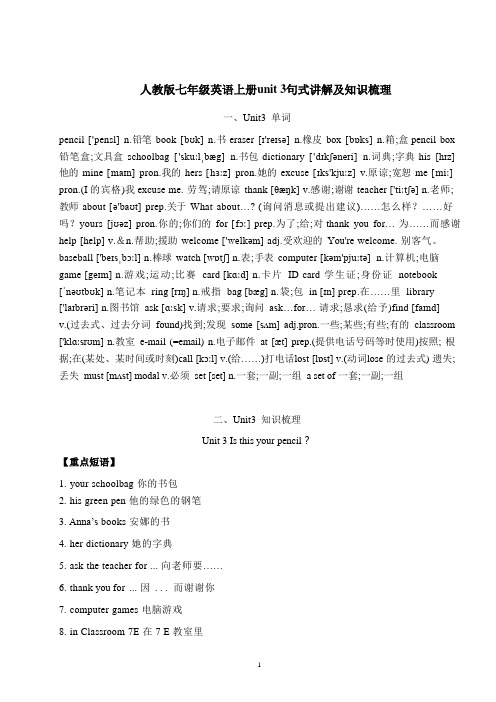
人教版七年级英语上册unit 3句式讲解及知识梳理一、Unit3 单词pencil ['pensl] n.铅笔book [bʊk] n.书eraser [ɪ'reɪsə] n.橡皮box [bɒks] n.箱;盒pencil box 铅笔盒;文具盒schoolbag ['skuːlˌbæg]n.书包dictionary ['dɪkʃəneri]n.词典;字典his [hɪz] 他的mine [maɪn] pron.我的hers [hɜːz] pron.她的excuse [ɪks'kjuːz] v.原谅;宽恕me [miː] pron.(I 的宾格)我excuse me. 劳驾;请原谅thank [θæŋk] v.感谢;谢谢teacher ['tiːtʃə] n.老师; 教师about [ə'baʊt] prep.关于What about…? (询问消息或提出建议)……怎么样?……好吗?yours [jʊəz] pron.你的;你们的for [fɔː] prep.为了;给;对thank you for… 为……而感谢help [help] v.&n.帮助;援助welcome ['welkəm] adj.受欢迎的You're welcome. 别客气。
baseball ['beɪsˌbɔːl] n.棒球watch [wɒtʃ] n.表;手表computer [kəm'pjuːtə] n.计算机;电脑game [geɪm] n.游戏;运动;比赛card [kɑːd] n.卡片ID card 学生证;身份证notebook [ˈnəʊtbʊk] n.笔记本ring [rɪŋ] n.戒指bag [bæg] n. 袋;包in [ɪn] prep.在……里library['laɪbrəri] n.图书馆ask [ɑːsk] v.请求;要求;询问ask…for… 请求;恳求(给予)find [faɪnd]v.(过去式、过去分词found)找到;发现some [sʌm] adj.pron.一些;某些;有些;有的classroom ['klɑːsrʊm] n.教室e-mail (=email) n.电子邮件at [æt] prep.(提供电话号码等时使用)按照; 根据;在(某处、某时间或时刻)call [kɔːl] v.(给……)打电话lost [lɒst] v.(动词lose 的过去式) 遗失;丢失must [mʌst] modal v.必须set [set] n.一套;一副;一组 a set of 一套;一副;一组二、Unit3 知识梳理Unit 3 Is this your pencil?【重点短语】1.your schoolbag 你的书包2.his green pen 他的绿色的钢笔3.Anna’s books 安娜的书4.her dictionary 她的字典5.ask the teacher for ... 向老师要……6.thank you for ... 因 ... 而谢谢你puter games 电脑游戏8.in Classroom 7E 在7 E 教室里9.in the school library 在学校图书馆10.call me 给我打电话11. call me at 495-3539 拨4 9 5 -3 5 3 9 打电话给我12.e-mail me at... 用……给我发电子邮件13.my school ID card 我的学生卡14.a set of keys 一串钥匙15. some keys 一些钥匙【重点句型】1.—What’s this? 这是什么?—It’s a watch. 一块手表。
人教版八下英语第三单元Unit 3 知识点归纳

Unit3 Could you please clean your room?重点知识归纳一、短语归纳1.go out for dinner 出去吃饭2.stay out late 在外面待到很晚3.go to the movies 去看电影4.get a ride 搭车5.work on 从事6.finish doing sth. 完成做某事7.clean and tidy 干净整洁的8.do the dishes 洗餐具9.take out the rubbish 倒垃圾10.fold your/the clothes 叠衣服11.sweep the floor 扫地12.make your/the bed 整理床铺13.clean the living room 打扫客厅14.no problem 没问题15.welcome sb. 欢迎某人e home from school/work放学/下班回家17.throw down 扔下18.sit down 坐下e over 过来20.take sb. for a walk 带某人去散步21.all the time 一直;总是22.all day/evening 整日/夜23.do housework 做家务24.shout back 大声回应25.walk away 走开26.share the housework 分担家务27.a comfortable home 一个舒适的家28.in surprise 惊讶地29.get something to drink 拿点喝的东西30.watch one show 观看一个节目31.hang out 闲逛32.pass sb. sth. 把某物传给某人33.lend sb. sth. 把某物借给某人34.get sth. wet 使某物弄湿35. hate to do sth. 讨厌做某事36.do chores 做杂务37.help sb. (to ) do /with sth.帮助某人干某事38.bring a tent带顶帐篷来39.buy some snacks买些小吃40.go to the store去商店41.invite sb. to a party邀请某人参加聚会42.make sb. do sth. 使某人做某事43.enough stress足够的压力44.a waste of time浪费时间45.in order to为了46.get good grades取得好成绩47.mind doing sth. 介意做某事48.depend on依赖;依靠49.develop children ’ s independence发展孩子的独立性50.look after/take care of 照顾;照看51.do one’ s part in (doing ) sth. 尽某人的职责二、用法归纳1.finish doing sth. 做完某事2.want sb. to do sth. 想要某人做某事3.try (not) to do sth. 尽力(不)做某事4.let sb. do sth. 让某人做某事5.spend......(in) doing sth. 花费......做某事6.mind doing sth. 介意做某事7.learn to do sth. 学习做某事8.learn how to do sth. 学习怎样做某事9.The +比较级,the+比较级越......,就越.....三、词句精讲1.Could you please take out the rubbish? 你能把垃圾倒了吗?Could you please do sth ?请你(做)......好吗?用于提出请求,希望得到对方的肯定回答,说话的语气比较客气委婉。
人教版英语必修3-Unit3-第三单元-词汇讲解
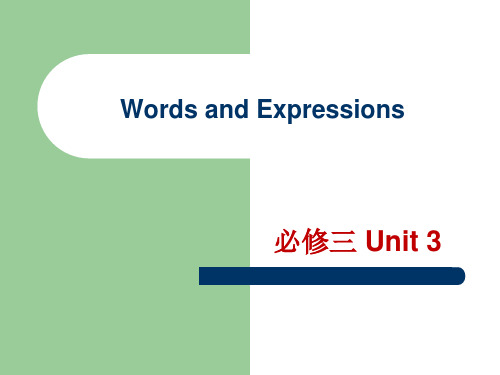
4.on the contrary 正相反, 恰恰相反 (只作状语)
(be)contrary to 违反, 与……相反 to the contrary 相反的(地)(作定语和状语) the contrary 相反;反面;对立面
It wasn’t a good thing; on the contrary it was a huge mistake.
+可数名词复数
a large/ great/ good number of
quite a little a great/ good deal of a large/ small amount of +不可数名词单数
大量, 许多
a large quantity of large quantities of plenty of a lot of lots of
spot sb./sth.doing sth.发现某人/某物正在做某事 be spotted with sth.被…….弄污
off the spot 不准确, 离题 on the spot 当场, 立即 put sb. on the spot 使某人尴尬, 使某人为难
6.spot
It’s easy to spot a tall man in a crowd.
(3) 走神 My attention/mind wandered. n. 漫游, 闲逛 go for /take a wander 去溜达
4.permit /vt.&vi./ 允许, 准许 /n./许可证, 执照
permit sb. to do sth. 允许某人做某事
permit sth./ doing sth. 允许某事/做某事 She won’t permit her dog to enter this yard. We don’t permit smoking in the office. permission/n./许可, 同意 ask sb. for permission =ask permission from sb. 请求某人许可 with/without (one’s) permission 得到/未经(某人的 )许可
新编英语教程unit3
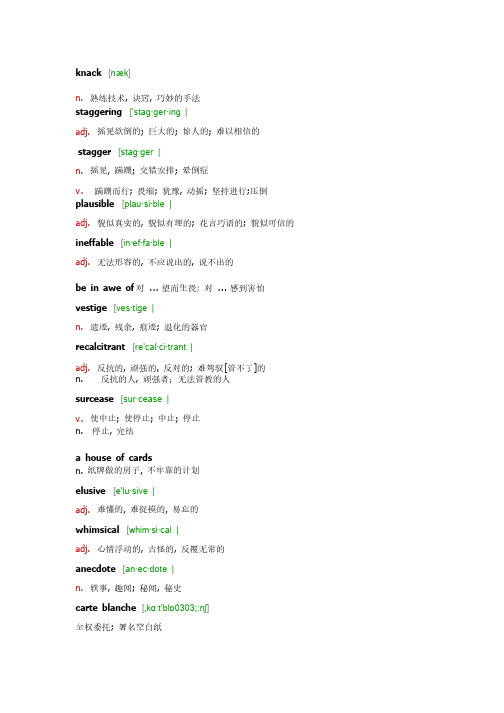
knack[næk]巧妙的手法n.熟练技术, 诀窍, 巧妙的手法staggering['stag·ger·ing |难以相信的adj.摇晃欲倒的; 巨大的; 惊人的; 难以相信的stagger[stag·ger |晕倒症n.摇晃, 蹒跚; 交错安排; 晕倒症压倒v. 蹒跚而行; 畏缩; 犹豫, 动摇; 坚持进行;压倒plausible[plau·si·ble |貌似可信的 adj.貌似真实的, 貌似有理的; 花言巧语的; 貌似可信的ineffable[in·ef·fa·ble |说不出的adj.无法形容的, 不应说出的, 说不出的感到害怕be in awe of对 ... 望而生畏; 对 ... 感到害怕vestige[ves·tige |退化的器官n.遗迹, 残余, 痕迹; 退化的器官recalcitrant[re'cal·ci·trant |adj.反抗的, 顽强的, 反对的; 难驾驭[管不了]的顽强者;无法管教的人n. 反抗的人, 顽强者;无法管教的人surcease[sur·cease |停止v.使中止; 使停止; 中止; 停止完结n. 停止, 完结a house of cards 不牢靠的计划n. 纸牌做的房子, 不牢靠的计划elusive[e'lu·sive |易忘的adj.难懂的, 难捉摸的, 易忘的whimsical[whim·si·cal |反覆无常的adj.心情浮动的, 古怪的, 反覆无常的anecdote[an·ec·dote |秘史n.轶事, 趣闻; 秘闻, 秘史carte blanche[‚kɑːt'blɒ0303;ːnʃ]署名空白纸全权委托; 署名空白纸plead with make an appeal to 向…恳求恳求awry [a ·wry |adv.歪斜地;扭曲地[的] look ~ adj. 脱离(路线)地[的]; (行动等)错误地[的],不顺遂地[的] go/run/tread~ prodigy [prod ·i ·gy |n.惊人的事物, 神童, 不凡的人不凡的人 infant/child podigy 神童神童不可思议之物; 壮观,奇观奇观The podigies of nature 自然奇观自然奇观自然奇观 dullard ['dull ·ard |n.愚人; 笨蛋笨蛋 stationary [sta ·tion ·ar ·y |adj.不动的; 定居的; 不增减的; 常备军的常备军的 n. 固定物(驻军) abreast [a ·breast |adv.并肩地; 并排地并排地 be [keep] abreast of [with] 与…并驾齐驱地并驾齐驱地 be ~ of [with] the times = keep ~ of the times 与时代并进,不落伍不落伍 patent [pat ·ent |n.专利权, 专利品, 执照执照 v.取得...的专利权, 请准专利请准专利 adj.专利的, 新奇的, 显著的,明显的; 明白的明白的 fabulous ['fab ·u ·lous |adj.传说的, 难以置信的, 惊人的; 非常的,无根据的;寓言般的; 想像中的想像中的 offshoot n. 分支, 支流,支道,旁系支流,支道,旁系collaborate [col ·lab ·o ·rate |v. (两个以上的人)合作(with (with……on/in ); 通敌,勾结勾结prey [pre ɪ]n.被掠食者, 牺牲者牺牲者 v.捕食, 折磨, 掠夺;使 ... 苦恼苦恼 quaint [kwe ɪnt ]adj.古雅的, 奇怪的, 离奇有趣的离奇有趣的 twirl [tw ɜrl ]旋转的东西n.旋转; 捻弄; 转动; 旋转的东西旋转v.快速转动, 捻弄; 转动, 旋转inward[in·ward || 'ɪnwə(r)d]内脏n.内部, 里面; 肠胃; 内脏向内的adj.内心的, 本来的, 向内的在内adv.向内; 在内furrow[fur·row |皱纹n.犁沟; 皱纹犁出浪迹v.犁; 弄绉; 耕; 犁田; 形成车辙; 开沟; 犁出浪迹placid[plac·id |沉著的adj.平静的, 平稳的, 沉著的fathom[fæðəm|推测n.深度单位; 推测看穿v.测量深度; 彻底了解; 看穿haggard| 'hægə(r)d]野鹰n. 野鹰形容枯槁的adj.憔悴的, 野性的, 形容枯槁的grief[grɪːf]grief-lined 伤心事n.悲痛; 不幸; 伤心事grope[grəʊp]的身体v.触摸; 探索, 探求; 暗中摸; 摸索; 抚摸...的身体暗中摸索的groping adj. 摸索的; 暗中摸索的steer[stɪr /stɪəɪə]阉牛n.指点, 建议#小公牛; 食用牛; 阉牛行进 v.掌舵, 驾驶; 带领; 指导; 操纵; 被驾驶, 驾驶起来; 行驶, 行进duet| djuː'et]二重奏n.二重唱; 二重奏reveal| rɪ'vɪːl]显示v.露出, 透露, 显示agitate[ag·i·tate || 'ædʒɪt e teɪt]煽动v.使激动; 搅动; 使焦虑; 摇动; 鼓动; 煽动wiggle| 'wɪgl]摆动n.踌躇, 摆动pier[pɪr /pɪə]桥墩n.码头, 防波堤, 桥墩generate| 'dʒenəreɪt]形成v.产生, 导致, 发生; 衍生; 形成tumble[tum·ble || 'tʌmbl] ~ down暴跌n.跌跤; 倒塌; 坠落; 暴跌使滚翻v.翻倒, 倒塌, 摔倒; 使摔倒, 弄乱, 使滚翻ineloquent inˋєləkwənt]无口才的adj.不善言辞的, 无口才的turmoil[tur·moil || 'tɜrmɔɪl /'tɜːɜː-]混乱 in a ~ n.骚动, 混乱revolutionary[,rev·o'lu·tion·ar·y || ‚revə'luːʃnərɪ]改革者n.革命者, 改革者革命性的 radical adj.革命的, 革命性的quantum[quan·tum || 'kwɑntəm /'kwɒ-]n.分配量, 量, 额serenity[se·ren·i·ty || sə'renətɪ]沉着n.晴朗, 风和日丽; 尊贵的阁下; 平静, 沉着殿下your Serenity 殿下confiscate[con·fis·cate || 'kɒnfɪskeɪt]充公v.没收; 查抄; 充公heed[hɪːd]留心n.注意, 留心注意 ~ sth/ give (pay) ~ to/take (no) ~ of v.留心, 注意agony['ag·o·ny || 'ægən a naɪz]爆发n.极度痛苦; 临死的痛苦; 苦恼; 爆发苦闷的in ~ 痛苦的,苦闷的他垂死的挣扎final ~ 他垂死的挣扎大喜的n an ~ of joy 狂喜的,大喜的战争的惨烈the ~ of war 战争的惨烈scarf[skɑrf /skɑːf]n.围巾; 头巾; 披巾; 领巾#嵌接; 槽; 斜面, 截面, 切口切口 akin [a ·kin || ə'k ɪn ] (to )adj.血族的, 同种的, 同族的同族的 cosmic [cos ·mic || 'k ɒzm ɪk(l)]adj.宇宙的, 有秩序的, 宇宙论的;广大无边的; 秩序井然的; 和谐的和谐的 ceaseless ['cease ·less || 's ɪːɪːsl ɪs ]adj.不停的, 不断的不断的 nerve [n ɜrv /n ɜːv ]n.神经; 忧虑, 焦躁; 神经过敏; 勇敢, 胆量胆量 v.鼓起勇气鼓起勇气 nerves 神经过敏神经过敏(的状态) ,神经质; 胆怯; 焦虑焦虑 神经过敏症,歇斯底里症歇斯底里症[又作又作a ~] 厚脸皮,无耻,冒失冒失 What (a) ~!.厚脸皮厚脸皮! delusion [de ·lu ·sion || d ɪ'lu ːʒn ]n.迷惑, 错觉, 欺瞒欺瞒 grandeur [gran ·deur || 'grændʒə(r)]n.庄严; 伟大;崇高,庄严庄严 conceit [con ·ceit || k ən'si ːt ]n.自负, 狂妄, 空想空想 roll into v. 滚进, 卷成, 使合为一体使合为一体=mix thoroughly; mingle together搅匀;拌和搅匀;拌和conversationalist [,con ·ver'sa ·tion ·al ·ist || ‚k ɑnv ə(r)'se ɪʃn əl ɪst /k ɒn-]n.健谈者, 交谈者, 爱交谈的人, 口才好的人口才好的人 maddeningly ['mædnɪŋl ɪ]adv.令人发狂地; 狂暴地; 狂怒地狂怒地 mania [ma ·ni ·a || 'me ɪnj ə] n.狂躁, 狂热, 热衷热衷 trivial ['triv ·i ·al || 'tr ɪv ɪəl ]adj.琐细的, 微不足道的, 价值不高的价值不高的 harangue [ha ·rangue || h ə'ræŋ]热烈的演说n.高谈阔论, 热烈的演说滔滔不绝地演讲v.滔滔不绝地演讲volubility[vol·u·bil·i·ty || ‚vɑljə'bɪlətɪ/‚vɒljʊ'b-]口若悬河 with ~ n.健谈; 口若悬河stun[stʌn]使惊吓v.使晕倒, 打晕, 使惊吓打昏n.晕眩, 惊倒, 打昏pamphlet[pam·phlet || 'pæmflɪt]小册子,宣传小册n.小册子,宣传小册applause[ap·plause || ə'plɔːz]鼓掌欢迎n.欢呼; 鼓掌欢迎eminent[em·i·nent || 'emɪnənt]杰出的adj.显赫的; 有名的; 杰出的vocalist['vo·cal·ist || 'vəʊəʊkəlɪst]歌手n.声乐家, 歌手rave[reɪv]热烈赞美n.胡言乱语; 呼啸, 咆哮; 狂骂; 热烈赞美v.胡言乱语; 激烈地说; 狂骂; 狂热赞扬, 极力夸奖; 赞扬的adj.赞扬的stamp[stæmp]n.邮票; 印花; 图章, 印v.贴邮票于; 盖章于; 压印于; 捣碎跺脚; 拒绝, 毁掉, 扑灭; 踩; 捣碎callous[cal·lous || 'kæləs]无情的adj.麻木的, 坚硬的, 无情的变得冷酷无情v.使硬结, 使麻木; 变硬, 结茧; 变得冷酷无情grovel[grov·el || 'grɑvl ,'grʌvl /'grɒvl]匍匐v.趴; 卑躬屈膝; 匍匐recipient[re·cip·i·ent || rɪ'sɪpɪənt]间接宾语n.接受者; 接受器, 容器; 受领者; 间接宾语unscrupulous/ʌnˈskruː.pjʊ.ləs/不谨慎的adj.无道德的, 狂妄的, 不谨慎的infidelity[in·fi·del·i·ty || ‚ɪnfɪ'delətɪ]无信仰,不忠诚n.不信神, 背信, 无信仰,不忠诚mortal[mor·tal || 'mɔrtl /'mɔːtl]人类n.凡人; 人类人类的adj.不免一死的, 临终的, 人类的burlesque[bur·lesque || bɜː'lesk]滑稽戏n.作戏, 滑稽戏取笑v.模仿; 取笑libretto[li·bret·to || lɪ'bretəʊ]歌词n.歌词集, 歌词testimony['tes·ti·mo·ny || 'testɪməʊnɪ/-mənɪ]证据n.证言, 声明, 证据作证bear ~ to 为…作证stupendous[stu·pen·dous || stuː'pendəs /-tju-]巨大的adj.惊人的, 巨大的span[spæn]跨绳n.墩距; 一段时间; 跨度; 指距, 一叉宽#跨绳套上 v.横跨, 跨越; 在...上建拱门; 在...架桥; 以指距量; 套上caricature[car·i·ca·ture || 'kærɪkə‚tjʊə]漫画n.讽刺画; 讽刺描述法; 漫画画成漫画讽刺v.画成漫画讽刺atonement[a'tone·ment || -mənt]赔偿 make ~ for n.补偿, 赎罪, 赔偿trilogy[tril·o·gy || 'trɪlədʒɪ]三部曲n.三部剧, 三部曲downright/ˈdaʊn.raɪt/率直的adj.明白的, 显明的, 率直的dumb[dʌm]不说话的adj.哑的, 无声音的, 不说话的be dumb with…. claw[klɔː]n.爪, 抓伤, 钩用爪子抓 v.用爪子抓; 费力地夺回; 用爪子抓shriek[ʃrɪːk]尖声n.尖叫, 尖声喊叫, 尖声尖声发出 v.尖叫, 发出尖锐的声音; 尖声发出。
九年级英语Unit3重点短语及句型

1、take:(1) It takes sb. +时间+to do sth. 做某事花了某人多少时间。
例:The journey to the airport takes about half an hour.到机场大约需要半小时。
(2)doing sth. takes sb. +时间,做某事花了某人多少时间。
例:Repairing this computer took him the whole morning. 修电脑花了他一上午的时间。
2、spend:(1) spend time /money on sth. 在……上花费时间(金钱)。
例:I spent two hours on this maths problem. 这道数学题花了我两个小时。
(2) spend time /money (in) doing sth. 花费时间(金钱)做某事。
例:They spent two years (in) building this bridge. 造这座桥花了他们两年时间。
3、cost:(1)sth. costs (sb.) +金钱,某物花了(某人)多少钱。
例:A new computer costs a lot of money. 买一台新电脑要花一大笔钱。
(2) (doing) sth. costs (sb.) +时间,某物(做某事)花了(某人)多少时间。
例:Remembering these new words cost him a lot of time. 他花了大量时间才记住了这些单词。
注意:cost的过去式及过去分词都是cost,并且不能用于被动句。
4、pay:(1) money for sth. 付钱(给某人)买……。
例:I have to pay them 1100 RMB for this house each month. 我每个月要交1110的房租。
(2)pay for sth. 付……的钱。
(完整版)英语必修三unit3知识点总结
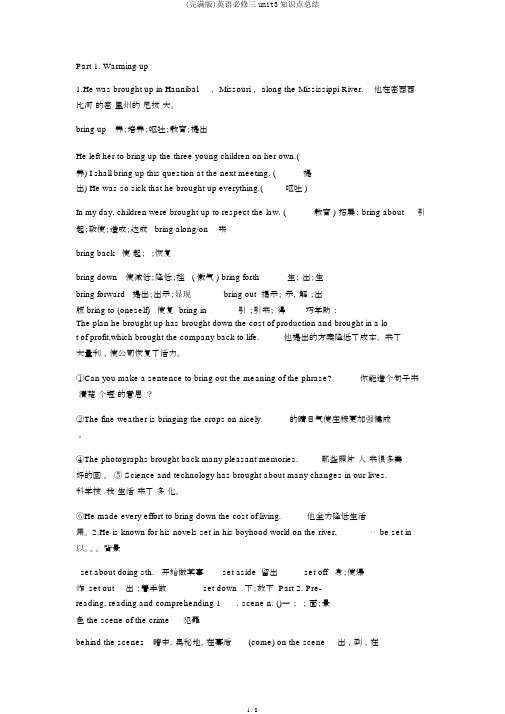
Part 1. Warming up1.He was brought up in Hannibal,Missouri,along the Mississippi River.他在密西西比河的密里州的尼拔大。
bring up养;培养;呕吐;教育;提出He left her to bring up the three young children on her own.(养) I shall bring up this question at the next meeting. (提出) He was so sick that he brought up everything.(呕吐 )In my day, children were brought up to respect the law. (教育 ) 拓展: bring about引起;致使;造成;达成 bring along/on 来bring back使起;;恢复bring down使减低;降低;挫 ( 傲气 ) bring forth生;出;生bring forward 提出;出示;显现bring out 揭示;示,解;出版 bring to (oneself) 使复 bring in引;引来;得巧学助:The plan he brought up has brought down the cost of production and brought in a lot of profit,which brought the company back to life.他提出的方案降低了成本,来了大量利,使公司恢复了活力。
①Can you make a sentence to bring out the meaning of the phrase?你能造个句子来清楚个短的意思?②The fine weather is bringing the crops on nicely.的晴日气使庄稼更加强健成。
人教pep五年级上册英语第三单元Unit3《What would you like》重要知识点总结

【精选】人教pep版五年级上册英语第三单元Unit3《What would you like?》重要知识点总结Unit3 What would you like?一、重点单词ice cream 冰淇淋hamburger 汉堡包sandwich 三文治eggplant 茄子fish 鱼salad 沙拉tofu 豆腐potato 土豆tomato 西红柿tea 茶juice 果汁fresh 新鲜的,刚摘的healthy 健康的delicious 美味的;可口的hot 辣的;辛辣的sweet 含糖的;甜的sour 酸的salty 咸的tasty 好吃的hungry 饿的thirsty 渴的;口渴的favourite 特别喜爱的food 食物drink 喝;饮carrot 胡萝卜chicken 鸡肉onion 洋葱milk 牛奶bread 面包beef noodles 牛肉面fish sandwich 鱼肉三明治tomato soup 西红柿汤noodles 食物fruit 水果lunch 中餐for 为;给don't = do not 不;非第三人称单数的否定形式they are =they're一日三餐的英语说法:breakfast 早饭lunch午饭dinner 晚饭二、重点句子1.—What would you like to eat?你想吃什么?—A sandwich, please.请给我一个三明治。
—What would you like to drink? 你想喝什么?—I'd like some water. 我想喝点水。
2.—What's your favourite food? 你最喜欢吃什么食物?—Noodles. They are delicious. 面条。
面条很好吃。
3.My/His /Her favourite food is fish.我/他/她最喜欢的食物是鱼。
- 1、下载文档前请自行甄别文档内容的完整性,平台不提供额外的编辑、内容补充、找答案等附加服务。
- 2、"仅部分预览"的文档,不可在线预览部分如存在完整性等问题,可反馈申请退款(可完整预览的文档不适用该条件!)。
- 3、如文档侵犯您的权益,请联系客服反馈,我们会尽快为您处理(人工客服工作时间:9:00-18:30)。
• Time Allotment: all together 3 periods • Teaching Objectives and Requirements • The students will learn the seriousness of refugee problems in different regions and countries of the world like Africa, former Yugoslavia, Asia, and Caribbean countries. • The students will learn some of the words related to the topic of text like repatriation, UNHCR, Humanitarian concern, mandate, displace, asylum, CIS and so on. • The students will learn the English names of some of the countries and regions which are closely related with refugee problems and can be often heard in radio international news.
contemporary refugee crises
• If you want to know about refugee crisis, you can go to following websites: • /wiki/Refugee • /
UNHCR
• The Office of the United Nations High Commissioner for Refugees was established on December 14, 1950 by the United Nations General Assembly联合国大会. Headquartered in Geneva, Switzerland, the agency is mandated to lead and co-ordinate international action to protect refugees and resolve refugee problems worldwide. • /cgi-bin/texis/vtx/home
• The term refugee is often used to include displaced persons who may fall outside the legal definition in the Convention, either because they have left their home countries because of war and not because of a fear of persecution, or because they have been forced to migrate within their home countries. The Convention Governing the Specific Aspects of Refugee Problems in Africa, adopted by the Organization of African Unity in 1969, employs a definition expanded from the Convention‘s, including people who left their countries of origin not only because of persecution but also due to acts of external aggression外来侵略, occupation, domination by foreign powers or serious disturbances of public order.
Refugee camps
• A refugee camp is a place built by governments or NGOs非政府组织 (such as the ICRC国际红十字会) to receive refugees. People may stay in these camps, receiving emergency food and medical aid, until it is safe to return to their homes or until they get retrieved by other people outside the camps. In some cases, often after several years, other countries decide it will never be safe to return these people, and they are resettled in "third countries," away from the border they crossed. However, more often than not, refugees are not resettled. In the mean time, they are at risk for disease, child soldiering, terrorist recruitment, and physical and sexual violence.
Pre-reading tasks: I
• Students will be given two minutes to solve the vocabulary problems listed in Word Pretest and then check the answers • CCCCAestions (group-discussion): • 1. How much do you about refugees? • 2. What do you think is the most fundamental cause of the world refugee problem? What do you think people in the world should do to sustain the peaceful development of the world? • 3.What are the bad influence of refugee? • Security threat/medical problem
• Its primary purpose is to safeguard the rights and well-being of refugees. It strives to ensure that everyone can exercise the right to seek asylum and find safe refuge in another State, with the option to return home voluntarily, integrate locally or to resettle in a third country. It also has a mandate to help stateless people. • In more than five decades, the agency has helped tens of millions of people restart their lives. Today, a staff of some 6,600 people in more than 110 countries continues to help about 34 million persons.
• The concept of a refugee was expanded by the Convention's 1967 Protocol and by regional conventions in Africa and Latin America to include persons who had fled war or other violence in their home country. Refugee women and children represent an additional subsection of refugees that need special attention. For the refugee system to work successfully, countries must be prepared to allow Open borders for people fleeing conflict, particularly for countries closest to the conflict. This is a program that has help many people, but people still believe there are flaws. Getting to a refugee camp is extremely difficult.
III Background information
Refugee
• A refugee is a person who is outside their country of origin or habitual residence because they have suffered persecution or for personal reasons on account of race, religion, nationality, political opinion, or because they are a member of a persecuted 'social group'. Such a person may be referred to as an 'asylum seeker' until recognized by the state where she makes her claim. Under the United Nations Convention Relating to the Status of Refugees联合国 难民事务高级专员(办事处) of 1951, a refugee is more narrowly defined as a person who "owing to a wellfounded fear of being persecuted for reasons of race, religion, nationality, membership of a particular social group, or political opinion, is outside the country of his nationality, and is unable to or, owing to such fear, is unwilling to avail himself of the protection of that country".
